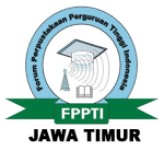Correlation of Students Final Paper to Archival Scientific Development
Case Study of Archival Science Study Program, Vocational College, UGM
Downloads
Background of the study: Student research paper have an important role in the effort to mapping scientific archival field. Scientific work in the form of a diploma student's final paper can be a representation of the real conditions of conceptual dynamics and archival practices. Therefore, this study analyzes how the relationship between student final paper and the development of archival education curriculum.
Purpose: This study aims to explain the correlation of student's final paper to the scientific development of archivel science at diploma level. The approach in this study refers to descriptive analysis.
Method: This study is a descriptive qualitative research The method in this study is a literature study and interviews, while the instruments used in data collection are the results of an inventory of the students final paper of the Archival Science Study Program, Vocational College, UGM from 1997-2020. The data analysis technique refers to the frequency distribution using Microsoft Excel program.
Findings: The tendency of students final paper related to the study of processing and managing textual is still dominant in the field of records. In addition, the dynamics of scientific development in the archival science still refers to the practical realm to create paraprofessional graduates in their fields.
Conclusion: The scientific development of archival science through discourse in an effort to develop and establish new study programs at the Diploma-3 and Diploma-4 levels is relevant, considering the needs of Arsiparis in several institutions or organizations, both in the public and private sectors.
Keywords: Archival Scientific, final paper, record
Downloads
Anderson, K., Bastian J. A., Flinn A. (2014). Mapping international core archives curriculum”, ICA-SAE Conference Papers,1(1).
Atmosudiro, S. (2008). Repertoire Fakultas Ilmu Budaya UGM. Yogyakarta: Unit Penerbitan dan Perpustakaan FIB UGM
Bramantya, A. R. (2020). Peran Pendidikan Kearsipan dalam Menghidupkan Arsip dan Kehidupan Sosial. Berkala Ilmu Perpustakaan dan Informasi, 16(1), 16-31, https://doi.org/10.22146/bip.v16i1.280
Bramantya, A.R. & Prasetyo, A. (2019). Between Reality and The Needs: Responsibilities of Educational Institutions in Developing Archival Science in Indonesia. Record and Library Journal, 5(2), 136-149. http://dx.doi.org/10.20473/rlj.V5-I2.2019.136-149
Couture, C. (2001). Education and research in archival science: General tendencies. Archival Science 1. https://doi.org/10.1007/BF02435646
Duranti, L. (2007). Models of Archival Education: Four, Two, One, or a Thousand?, Archives & Social Studies: A Journal of Interdisciplinary Research. 1 (0).
Duranti, L. & Franks, Patricia. (2015). Encyclopedia of Archival Science. London: Rowman & Littlefield.
Eastwood, T. (1996). Reforming the Archival Curriculum to Meet Contemporary Needs. Archivaria. 42.
Guercio, M. (2012). Innovation and Curricula: an Archival Perspective on Education of Digital Curators. Comma. 2010 (1).
Keputusan Rektor Nomor 825/UN1.P/Sk/Hukor/2018 tentang Penggunaan Metode Blended Learning Dalam Pembelajaran di Lingkungan Universitas Gadjah Mada
Komariah, A. & Satori, D. (2012). Metodologi Penelitian Kualitatif. Bandung: Alfabeta
Lindsay, D. (2011). Scientiï¬c writing = thinking in words. Australia: CSIRO publishing
Lopez, A. P. A. (2010). Building the archives profession in Brazil. Comma. 2010 (1).
Magetsari, N. (1997). Arsip Sebagai Sumber Informasi. Jurnal Kearsipan ANRI. 1 (1).
O'Flaherty, V. B. (2012) Online training programs, an opportunity to be developed Distance learning: some personal perspectives. Comma. 2010 (1).
Peraturan Kepala Arsip Nasional Republik Indonesia Nomor 4 Tahun 2017 Tentang Pelaksanaan Tugas Jabatan Fungsional Arsiparis
Rakhmawati, R. dan Khoiriyah, W. (2020). Analisis Bibliometrika Kajian Kearsipan: Studi Kasus Jurnal Nasional Terakreditasi Bidang Perpustakaan, Informasi, dan Kearsipan. Diplomatika, 3(2), 137-147, https://doi.org/10.22146/diplomatika.57895
Suharyadi dan Purwanto. (2009). Statistika untuk Ekonomi dan Keuangan Modern. Jakarta: Salemba Empat.
Sulistyo-Basuki. (2019). Napak Tilas Arsiparis Indonesia; Sejarah Dan Tantangannya Pada Masa Depan, makalah disampaikan dalam Kuliah Umum Program Studi Manajemen Informasi dan Dokumen, Program Pendidikan Vokasi Universitas Indonesia, 25 Maret 2019
Suprayitno. (2014). Pemetaan Jurnal Kearsipan Terbitan Arsip Nasional RI (ANRI) Tahun 2006-2010: Kajian Bibliometrika. Jurnal Kearsipan, 10.
Turner, M. (2012). The Accreditation of Training Programmes in Archive Asministration and Record Management in The UK and Ireland. Comma. 2010 (1).
Waluyo. (2018). Posisi, Perkembangan, dan Peran Keilmuan Kearsipan di Indonesia, makalah disampaikan dalam Seminar Nasional Kearsipan Peran Strategis Kearsipan Dalam Menunjang Kinerja Organisasi Publik dan Privat, 9 Oktober 2018, Program Studi Kearsipan Sekolah Vokasi UGM.
Widodo, B. P. (2017). Kedudukan Arsiparis Dalam Melakukan Penelitian, Pengkajian dan Pengembangan Sistem Kearsipan. Khazanah: Jurnal Pengembangan Kearsipan 10(2), 75-91, https://doi.org/10.22146/khazanah.30080
Copyright (c) 2022 Arif Rahman Bramantya, Rina Rakhmawati

This work is licensed under a Creative Commons Attribution-ShareAlike 4.0 International License.
Record and Library Journal by Unair is licensed under a Creative Commons Attribution-ShareAlike 4.0 International License.
1. The journal allows the author to hold the copyright of the article without restrictions.
2. The journal allows the author(s) to retain publishing rights without restrictions
3. The legal formal aspect of journal publication accessibility refers to Creative Commons Attribution Share-Alike (CC BY-SA).
4. The Creative Commons Attribution Share-Alike (CC BY-SA) license allows re-distribution and re-use of a licensed work on the conditions that the creator is appropriately credited and that any derivative work is made available under "the same, similar or a compatible license”. Other than the conditions mentioned above, the editorial board is not responsible for copyright violation.


 57201398420
57201398420

























